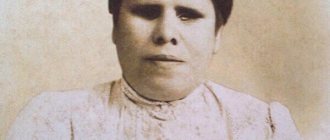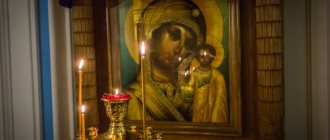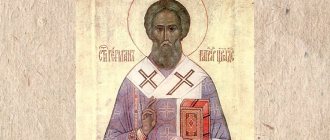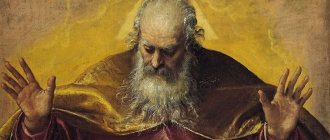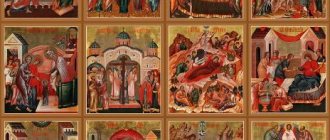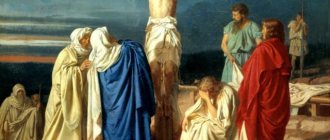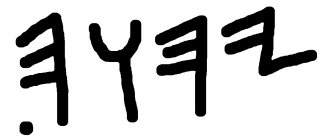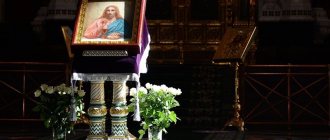The story of the birth of Jesus Christ is no less important for children than for adults. After all, the Savior came into our world for the sake of every person. He himself said:
“Suffer the children to come to Me and do not forbid them.”
(Luke 18:16)
Once upon a time, Jesus Christ himself was a child. His birth was predicted by the wise Jewish prophets. The Bible talks about this. Then it describes the story of the Nativity of Christ, His amazing life and sacrifice for people.
The memory of the Savior was preserved for future generations by four writers - evangelists: Matthew, Luke, Mark and John. It is to them that we owe what we can tell children about the Nativity of Christ today.
For many centuries the coming of Jesus Christ was predicted by prophets
The Jews knew in advance about the coming birth of Jesus Christ. Wise people - prophets - warned them about this. These wise men were chosen by God.
He gave them the ability to see the future. Many of the prophets wrote down their visions, and their texts became part of the Holy Scriptures - the Bible.
Isaiah - the prophet who predicted the birth of Jesus Christ
The coming of the Savior is very important for humanity. And the prophets who knew this made every effort to tell people the details of the coming event.
They called Jesus Christ the Messiah and reported that he would be born in the city of Bethlehem. The prophets also retold the main events of the life of Jesus Christ.
The main events in the life of Jesus Christ were predicted by the prophets of the Old Testament.
The prophecies about the Messiah are so full of sublime feelings that many Jews were waiting for the appearance, if not of God, then of a powerful and strong king.
Not everyone could imagine that Jesus Christ would be born in a humble place, surrounded by animals and loved ones.
This event did not meet the expectations of the Jews so much that they still do not recognize Jesus Christ as the Messiah and are waiting for someone else. Although the prophets also predicted that the Savior would be rejected.
King of Heaven
What did earthly kings and rulers fear most? The fact that Christ claims their earthly power. Since everyone says that He is the King, it means that He wants to remove them from the throne and take their place!
But that's not true. Christ is the King, but not in our earthly understanding. He did not come to Earth to rule the state, sit on a throne wearing a crown and give orders to his subjects. Jesus Christ is the King of Heaven. Having suffered on the cross for all humanity and resurrected, he opened the doors to this Heavenly Kingdom for each of us, regardless of where and at what time we were born and live and what position we occupy. Anyone can enter the Kingdom of Heaven. To do this, we must believe in Jesus Christ and keep His commandments, following what He calls us to.
Drawings by Galina Voronetskaya
Archangel Gabriel announced the birth of Jesus Christ to His mother, Mary.
In Galilee, according to biblical history, there was a town called Nazareth. It is so small that ancient authors wrote nothing about it. At least, no information about Nazareth has reached us. The city became famous later - when the whole world learned about Jesus Christ.
In Nazareth there lived a woman named Mary. Until the age of fourteen she was raised in the temple. When her parents died, Joseph, an elderly carpenter, began to take care of her. He took Maria to his home.
Mary was distinguished by her love for God, read holy books with interest, and went to church.
Archangel Gabriel informs Mary that Jesus Christ will be born to her
One day, the elder angel, Archangel Gabriel, appeared to her. He is often called the messenger of God precisely because he brings messages to believers. The Archangel told Mary to rejoice because the Lord is with her.
When Mary did not understand anything, God's messenger explained to her that she would give birth to a Son named Jesus. Her child has a great future ahead of him, for He is called the Son of the Most High.
Here's how the story is told in the Bible:
“In the sixth month the angel Gabriel was sent from God to a city of Galilee, called Nazareth, to a virgin betrothed to a husband named Joseph, from the house of David; The name of the Virgin is: Mary. The angel, coming to Her, said: Rejoice, full of grace!
The Lord is with You; Blessed are You among women. She, seeing him, was embarrassed by his words and wondered what kind of greeting this would be.
And the Angel said to Her: Do not be afraid, Mary, for You have found favor with God; and behold, you will conceive in your womb and give birth to a Son, and you will call His name Jesus.”
(Luke 1:26–31)
Maria humbly and gratefully accepted her fate.
Since then, Orthodox Christians have celebrated the holiday of the Annunciation on this day. We do not know exactly on what date the Archangel Gabriel visited Mary, but the believers agreed to celebrate April 7th.
Joseph and Mary began to wait for the birth of the Son of God
Herod Antipas - the king who laughed at Christ
King Herod died. His son Herod Antipas began to rule Galilee, the land where Jesus lived with his family.
What kind of man was Herod Antipas? Spoiled, pampered, lover of entertainment, luxury and bliss. And, like a father, cruel. It was he who ordered the execution of the great prophet John the Baptist.
Herod Antipas, of course, heard about Jesus. And he feared Christ just as his father once feared. Antipas was told that a wandering preacher who showed up in Galilee works miracles: he restores sight to the blind, raises the paralyzed from their beds, feeds thousands of people, casts out demons and even raises them from the dead! Herod Antipas was frightened: maybe Jesus is the resurrected John the Baptist, who came to take revenge?
Or maybe Christ is the resurrected prophet Elijah? Or some other ancient prophet?..
Herod Antipas wanted to find Jesus in order to find out who He was, to interrogate him, and even sent detachments of soldiers to search for Him. When Christ was warned of the threat, He called Herod Antipas a “fox.” The Savior knew that he was cunning and cunning like a fox. However, Herod Antipas never met Jesus in Galilee.
Their meeting took place shortly before the crucifixion, when the authorities had already arrested Christ. The Roman governor Pontius Pilate then sent Jesus to Herod Antipas, because Christ lived in Galilee and was considered his subject. But there was no need to take Jesus from Jerusalem to Galilee: it happened on Easter, Antipas himself arrived in the capital at that time on the occasion of the holiday.
Herod was very happy and excited - he would finally be able to see the famous preacher, healer, philosopher, about whom they talk so much... True, the high priests claim that Jesus is also a rebel and a criminal... But the arrested Christ no longer frightened Herod, but to have fun he wanted to have a conversation with an unusual interlocutor. They say that this preacher is a miracle worker. It will be fun if he performs some miracle, some funny trick in front of everyone! And Herod himself will laugh, and the guests will have fun...
How did the meeting between Jesus and King Herod Antipas take place? Maybe so?
The chief priests and the Roman guards led Jesus into the palace. Herod, cheerful and excited, almost ran into the hall - the servants barely had time to throw a rich robe over his shoulders - and began to look around with curiosity:
- Jesus of Nazareth? Where is he? Where?..
The gloomy high priests stepped aside. A man covered in bruises in dirty clothes stood silently, his head hanging down.
“This one?..” Herod Antipas was clearly disappointed. “Is it true that you restored sight to a blind man?”
Christ was silent.
- And raised the dead?..
Jesus was silent.
- Where do you get your strength from?.. Was your birth predicted?.. Answer!
The prisoner did not look up. Those in the hall listened, grinned, some openly laughed at the prisoner. Herod pointed at them. He even felt a little sorry for the beaten preacher: he knew that all the accusations of the high priests were nonsense, they were doing this for their own personal purposes, feeling a threat to their power.
- They say you are a king?.. But what about me? - asked Herod.
Jesus raised his head for a moment and looked closely at Herod. He said nothing and lowered his gaze. Herod winked at his subjects:
- Listen, won’t you create a small miracle for me?
The arrogant wife of the ruler, Herodias, in a luxurious outfit and jewelry, rose from her bed with interest. The courtiers also perked up, anticipating an entertaining spectacle. But Jesus was silent.
Without waiting for an answer, Herod walked around the prisoner, tried to look into his face and suddenly laughed loudly, pointing his finger at Christ:
- Ahaha! Get this fool out of my sight! He can’t and doesn’t know how to do anything! He is not guilty of a crime! He's... just crazy!
Following the master, all the courtiers and servants laughed, and the slaves also grinned. Still would! Herod Antipas rejoiced: “Jesus did not perform any miracle, which means He is not dangerous at all. He doesn't deserve death. But what fun it is to laugh at a magician who has fooled so many people!”
To once again laugh at Christ and at the Jews who captured Him, Herod ordered to put on Him long, light-colored clothes, which were usually worn by candidates for public office in the Roman Empire: look, they say, how funny it is - Jesus being arrested as a candidate for the kingdom in a country captured by the Romans. In this attire, Jesus was sent back to Pilate.
Antipas, the Galilean ruler mired in sins and passions, did not discern the King of Heaven in the silent prisoner, did not understand who was in front of him. At the same time, he did not find guilt in those crimes that the Jews attributed to Him, he was only amused...
Mary and Joseph went to the census in Bethlehem, and there Jesus Christ was born to them
The country in which Joseph and Mary lived was ruled by King Herod the Great, but he was subordinate to the ruler of the Roman Empire. It was then a very influential state.
And so the Roman emperor named Octavian Augustus made a decree on a population census. This was in 7 BC.
The Roman Emperor Octavian Augustus ordered everyone to return to their hometowns for the census.
Each person had to appear in the city where he came from. For Joseph, such a city is Bethlehem. This is a small but very ancient city: today it is almost 2.5 thousand years old.
Joseph took his pregnant wife and went with her to the census in Bethlehem. This is how it is described in the Bible:
“In those days a command came from Caesar Augustus to make a census of the whole earth.
This census was the first during the reign of Quirinius in Syria.
And everyone went to sign up, each to his own city. Joseph also went from Galilee, from the city of Nazareth, to Judea, to the city of David, called Bethlehem, because he was from the house and family of David, to enroll with Mary, his betrothed wife, who was with child.”
(Luke 2:1–5)
Mary and Joseph were unable to stay at the inn in Bethlehem because there was no room there. Probably everything was occupied by other people who were also in a hurry to get the census.
Where exactly Joseph and Mary stayed is not directly stated in the Bible. But even the first Christians began to believe that this happened in a cave. They were often used as a stable, so it was warm inside and you could sleep on soft hay.
There is even a cave where Jesus Christ is believed to have been born. There is a Christian shrine there. The place of birth is marked with a silver star in the floor.
It is generally accepted that Jesus Christ was born in this cave 2 thousand years ago.
The Holy Scriptures do not tell not only the date, but also the year of the birth of Christ. In the Orthodox tradition, it is customary to celebrate this event on January 7th.
January 7 is the date when Orthodox Christians celebrate the birth of Jesus Christ
Medieval “Childhood of the Savior”: how a palm tree gets to heaven
In the 9th–10th centuries, new, Latin versions of the Gospels of Christ’s childhood appeared, which were then translated into the national languages of Europe. In the medieval “Book of the Birth of the Graceful Mary and the Childhood of the Savior”, in the form of correspondence between Jerome, an opponent of the apocrypha, and the bishops (false, of course), on behalf of the former, it is said that the book was written by the Evangelist Matthew himself in Aramaic, and as if Jerome himself translated this work, to cast aside all doubts about hitherto unknown episodes in the life of the Savior and his mother. Matthew, one of the four authors of the history of the life of Jesus, was as indisputable an authority as Jerome, an expert in the Scriptures and its languages. Since Matthew was not actually the author of this Gospel, scholars began to call the apocrypha the “Gospel of Pseudo-Matthew.”
Compared to the late ancient apocrypha, it is even more amazing for the reader - Jesus works miracles in it not from the age of five, as in early sources, but from infancy, even the most powerful people and animals are subordinate to him, the Roman and Egyptian authorities are subject to him, not to mention already about heaven, and fantastic creatures live on earth.
In addition, since the fight against paganism in the 10th century was no longer relevant, the devil himself becomes the main enemy of Christ, and even the boy who destroys the dams of Jesus is called the devil.
“The Gospel of Pseudo-Matthew” begins with stories about Mary’s ancestors, her marriage to Joseph (the right to marry was played out by lot - Joseph miraculously flew out a dove from his staff, indicating that he should be with Mary), about doubts Joseph regarding Mary's virginity and subsequent testing in the temple with bitter water.
Christ's first miracle is described in the story of a midwife who doubted Mary's virginity, for which she paid with her own hand (and was later healed by Jesus).
The second miracle of the infant Christ occurs on the way to Egypt - the holy family decides to rest in the shadow of a cave, when it suddenly turns out that this place is inhabited by a great many dragons. Everyone is scared and wants to run, but Jesus gets away from his mother and the dragons begin to bow to him. Leopards and lions come out and also worship the true God, and then even accompany the family, showing the right path.
While resting in the desert on the third day of the journey, Mary wanted to taste the fruit from a very long palm tree, since there was nothing to drink, but Elder Joseph could not climb so high. Then Christ made the tree bend down and everyone was able to be satisfied with the fruits. A source of water opens under the roots of the palm tree, and, as if in gratitude for this service, Jesus, with the help of an angel, carries a branch of this palm tree to heaven to plant it there.
Then Christ shortened the family's journey from thirty days to one, and they immediately arrived in Egypt.
When the family entered the local pagan temple, all the idols in it immediately fell to the ground, and the mayor himself came with an army to deal with it. However, instead of attacking Mary and the baby, he bowed to them and recognized Jesus as the true God.
These new episodes are replaced by those already familiar to us from earlier apocrypha: the miracle of clay sparrows and the punishment of the boy who destroyed the dam, here the “son of the devil”; the murder of the “son of perdition”, who ran at Jesus - however, in this version the Savior resurrects him, “taking him by the ear” (and in the illustration he does this completely reluctantly, with a kick); confrontation with teachers; a child falling from a roof and being resurrected; miracle with water in a raincoat; miracle with multiplication of harvest. Then a new story is told about a lioness in a cave, which was tamed by the eight-year-old Christ - he crossed the river, which parted before him, right along with the lions, and entered the city with them, frightening the inhabitants.
Afterwards there are familiar stories again - about helping Joseph with a carpentry order, the murder of a teacher, healing from a snake bite, as well as a variation on the theme of reviving the dead - the resurrection of a person who died from illness with the help of Joseph's handkerchief. The apocrypha ends with the following phrase: “When Jesus slept, day and night the light of God shone upon him”; she emphasizes his supernatural abilities.
An angel informed the shepherds about the birth of Jesus Christ
The first to learn about the birth of the Messiah were not kings or priests, but simple shepherds. An angel appeared to them and showed them where to look for the baby Christ:
“In that country there were shepherds in the field, keeping watch over their flock by night.
Suddenly an Angel of the Lord appeared to them, and the glory of the Lord shone around them; and they were afraid with great fear.
And the Angel said to them: Do not be afraid; I bring you good news of great joy, which will be to all people: for today a Savior has been born to you in the city of David, who is Christ the Lord; and here is a sign for you: you will find a baby wrapped in swaddling clothes, lying in a manger.
And suddenly a large army of heaven appeared with the Angel, glorifying God and crying: Glory to God in the highest, and on earth peace, good will toward men!”
(Luke 2:8-14)
An angel informs the shepherds about the birth of Jesus Christ
The shepherds listened to the angel and found Joseph, Mary and her newborn Son:
“When the angels departed from them into heaven, the shepherds said to each other: let’s go to Bethlehem and see what happened there, which the Lord told us about.
And they hastened and came and found Mary and Joseph, and the child lying in a manger.
When they saw it, they told about what had been announced to them about this Child.
And all who heard were amazed at what the shepherds told them. But Mary kept all these words, writing them in Her heart.
And the shepherds returned, glorifying and praising God for all that they had heard and seen, as it had been told them.”
(Luke 2:15-20)
Pontius Pilate - the official who condemned Christ
By the end of Christ's earthly life, Judea was already completely under the rule of the Roman Empire. In Rome, the capital, sat the emperor, the ruler of the vast Roman Empire, and in distant lands, the Roman provinces, his interests were represented by special officials - governors, procurators. They kept order, ensured that everyone recognized the power of the Roman emperor, revered him, paid him taxes and did not think of rebelling. Emperor Tiberius appointed Pontius Pilate to govern the province of Judea. He was a warrior and belonged to the noble class of the Roman Empire.
Pontius Pilate was considered a good manager. He did a lot of useful things for Jerusalem. But as a person, Pilate was power-hungry, tough, and did not take into account the interests of the Jews: he brutally suppressed their uprisings, spent money from the temple treasury on the construction of a water pipeline... At the same time, he paved the streets, laid roads... And yet the Jews did not love him, just as they did not They loved all the Romans in general - the invaders of their lands. Pilate, in turn, did not like the Jews with their confusing religious customs and endless feuds.
How did Pilate meet Christ? Christ was not arrested on his orders - a detachment of soldiers and ministers was sent to search for Jesus by the high priests and Pharisees. They unjustly sentenced the Savior to death. But they could not carry out the sentence themselves - it was necessary for the execution to be approved by the Roman procurator Pontius Pilate.
On the morning after the night trial, Christ was brought to the governor, to the praetorium. Praetoria is the place where Pilate lived when he was in Jerusalem.
The rulers of Judea, as a rule, lived not in Jerusalem, but in Caesarea, and on holidays they came to the capital and settled in the praetorium - a fortress with large luxurious chambers.
Pilate, of course, had heard about Jesus before. He also knew about the desire of the high priests to execute Christ, who irritated them so much, and was confident that he would easily figure out this simple matter. However, the ruler probably understood that if he did not agree with the decision of the Jews, they could begin to outrage the people, write a complaint to the emperor - in general, cause him a lot of unnecessary trouble. And if he agrees, he will show weakness in front of the high priests, which was also disadvantageous in his position. Eh, it would be better if the Jews sorted it out among themselves and did not involve him in their affairs...
The bound Jesus was brought before the governor.
-What do you accuse this Man of?
“He corrupts our people and forbids giving tribute to the Roman emperor, calling himself Christ the King!” - the high priests shouted, pointing to Christ.
-Are you the King of the Jews? - Pilate asked sternly.
Christ looked calmly and kindly at Pilate:
“Are you saying this on your own behalf, or have others told you about Me?”
- Am I a Jew? - the procurator was surprised. “Your people and the chief priests handed you over to me; what did you do?
- My kingdom is not of this world. If My Kingdom were of this world, My servants would have stood up for Me, so that I would not be betrayed to the Jews. But now My Kingdom is not from here.
Pilate was completely confused. What was this strange preacher talking about?
What kingdom? The governor, a military man, is accustomed to clarity and specificity: the king is the king. The Emperor of Rome has a throne, and the kings of the Jews have thrones. There are kings in other states. What throne is Jesus of Nazareth going to take?
- So, you are the king?
- You say that I am a king. For this I was born, for this I came into the world, to testify to the truth; everyone who is of the truth listens to My voice.
-What is truth? - Pilate sighed and went out to the Jews who had gathered in the courtyard of his palace.
The procurator had already realized that the Man whom he at first mistook for an eccentric wandering philosopher was neither a rebel nor a conspirator. But... they said about Christ that He is the Son of God! But Pilate was a pagan and believed that there were many different deities in the world and many of them had children... What if Jesus was really the son of some Jewish deity? You will harm Him, and He will call His powerful divine relatives to take revenge on the offender? In addition, Pilate’s wife said that she had a dream about Christ, and asked to spare Him... It’s not without reason that all this was alarming and restless in Pilate’s soul...
He loudly announced to the people:
“I don’t find any guilt in this man!”
But the Jews did not calm down.
“He is disturbing the people by teaching throughout Judea!”
"What to do? - Pilate was tormented. “Maybe if I punish Him, order Him to be tortured, beaten with whips, pity will awaken in the Jews?”
They beat Christ cruelly and terribly. They put a crown of thorns on His head - “Since you call yourself a King, here is your crown!” Mocking, they dressed him in a soldier’s crimson-red cloak, similar to those expensive robes that were worn by the most powerful and rich people of the ancient world: so, if they call you the king of the Jews, accept the royal vestments. Then, exhausted, they took him out again to the people. And again Pilate declared that he did not find in Christ any guilt worthy of death. He even added:
- This is a Man! - as if prompting: “People, look, well, what kind of King is He? He is ordinary, just like you! And nothing threatens the Roman ruler!” The procurator also remembered the long-standing Jewish custom of releasing one criminal on Easter, and now these were holidays. The prosecutor suggested:
“Do you want me to release the King of the Jews to you?”
- No! - the crowd shouted. - Crucify him!
Here the high priests began to blackmail Pilate:
“If you let Him go, you are no friend of the Roman Emperor.” Anyone who calls himself a king is his opponent.
Pilate could only sigh: “Well, I did everything I could. You yourself wanted this..."
The governor approved the death sentence for Jesus - crucifixion, the most shameful execution in the Roman Empire to which slaves were subjected. But, wanting to emphasize his innocence, I remembered another Jewish ritual: when the Jews found a murdered person, they washed their hands and said that their hands did not shed innocent blood, and their eyes did not see the murder. So Pontius Pilate washed his hands in front of all the people and said:
“I am innocent of the blood of this Righteous One!”
But is it true? Is Pontius Pilate really innocent?
No. He could have overturned the sentence. I could have gone against the crowd, against the high priests, but I did not dare to do so...
The Star of Bethlehem led the Magi to the baby Christ
The news of the birth of the Savior reached not only the shepherds, but also some wise men living in the East. They probably mean priests from Persia or Media. At least, this is what the text of the Bible hints at.
The Magi were led to the birthplace of Jesus Christ by a strange phenomenon in the sky - something that looked like a very bright star.
What it was is a lot of debate today. Some people think it's a comet. Others say that it is a conjunction of two planets: Jupiter and Saturn. There are also those who believe that the Star of Bethlehem has nothing to do with astronomy.
There is still no consensus on what the Star of Bethlehem was: a comet, a planet or something else
The glow in the sky attracted the Magi. They knew the prophecies about the coming of the king of Judah. For example, the prophet Balaam warned about the star:
“I see Him, but now I am not yet; I see Him, but not close. A star rises out of Jacob, and a rod rises out of Israel, and smites the princes of Moab, and crushes all the sons of Seth.”
(Num. 24:17)
However, the wise men understood the expression “king of the Jews” in their own way - and went to King Herod the Great. They expected him to have an heir.
“When Jesus was born in Bethlehem of Judea in the days of King Herod, wise men from the east came to Jerusalem and said, “Where is he who has been born King of the Jews?” for we saw His star in the east and came to worship Him.”
(Matt. 2:1-2)
The king assured the guests that they had come in vain. And then they hit the road again. This time, the Star of Bethlehem led the Magi to the newborn baby Jesus.
The Magi who followed the Star to see Jesus. They are often depicted on camels - this emphasizes the long journey made by travelers
The travelers brought him 3 gifts:
- Gold is a symbol of royal greatness.
- Frankincense is a symbol that Christ will be a teacher of people.
- Myrrh (fragrant oil) is a symbol of the sacrifice that the Mission will make.
Due to the fact that there are three gifts, the Magi are often depicted as three people. But the Bible says nothing about their number. Often on icons the shepherds are confused with the wise men, or only one of the groups of people is left.
Birth of John the Baptist
The time came, and old Elizabeth gave birth to a son. All her friends and relatives rejoiced with her at this mercy of the Lord.
On the eighth day from birth, Jewish custom prescribed to perform a sacred rite over the boy and give him a name. The relatives gathered in the house and the priest wanted to name the baby in honor of his father Zacharias. But Elizabeth did not agree. She said that the child should be named John. Everyone was surprised and began to tell her that neither she nor her husband had anyone with that name in their family. Elizabeth stood her ground.
Then everyone went to the mute Zechariah to ask him. He asked with signs to give him a wax tablet on which they usually wrote, and inscribed the name on it - John. At that moment, the muteness left him and he was able to speak. From such an obvious miracle, all the guests were confused.
Zechariah, having regained the gift of speech, began to prophesy. The Holy Spirit Himself spoke through his lips:
- Blessed be the Lord God! He visited His people and gave them the salvation that He had announced through the ancient prophets. He kept the oath he made to our forefather Abraham that he would deliver us from all enemies and show us mercy. And you, Child of God, will become a prophet of the Most High. You will go ahead of the Lord and prepare His way. You will enlighten the dark and unreasonable. They will learn from you: their salvation lies in the fact that the Lord, in His mercy, forgives them all their sins...
For a long time after this day, rumors and conversations continued throughout Judea about what had happened in Zechariah’s house. People marveled and said:
– What will happen to this child next if such miracles are performed and such prophecies are uttered at his birth? Probably God is with him and the grace of the Lord is overshadowing him.
Jesus Christ was born to make our world a better place
Two thousand years ago Jesus Christ appeared on earth. He chose a modest place for his birth, a barn, and came modestly - but with an important mission. This event is very significant for humanity. During his short life, Jesus Christ gave the world a lot of necessary knowledge about a righteous life, about God, love, and the values of a good person.
The image of the newborn Jesus is very loved by humanity. He is a popular topic:
- icons;
- frescoes;
- paintings;
- New Year's cards.
And much more. By the way, it is the birth of Christ that is depicted on the most popular edition of the children's Bible in Russia.
The Nativity of Jesus Christ on the cover of a children's Bible
Jesus Christ is an example for every believer, and therefore His Nativity is one of the most beloved holidays in the world.
The Christmas holiday is lost against the backdrop of traditional New Year's greetings, Christmas trees, and gifts. However, the story of Christmas is no less important for children than for adults. We are all equal before God. The Holy Spirit illuminates the life of every person equally.
We must know that on this holiday the Savior presented us with one of the most important gifts - his love.
By leaving a comment, you accept the user agreement
Miracle of Christmas
The miracle of Christmas is that for the first and only time, the immaculate Virgin gave birth to a Child. The news of the birth of Jesus, the Son of God, was brought by an Angel. From that moment on, Mary and her betrothed Joseph eagerly awaited God's child.
Therefore, it is believed that at Christmas the heavens open and you can ask them for anything. The main thing is that the desire is kind, sincere and bright. On the night before and on Christmas, miracles happen: people are healed of illnesses, their dreams come true. You only need to believe in a miracle with all your heart.
A story about Christmas for children needs to be supplemented with holiday symbols.


